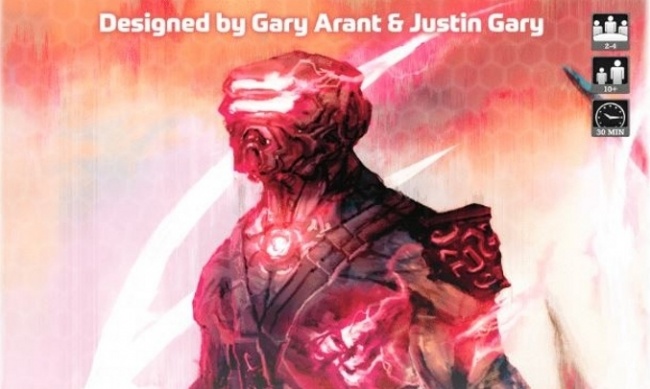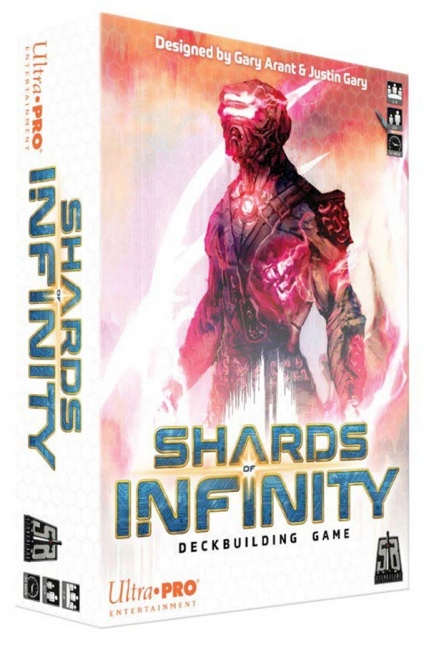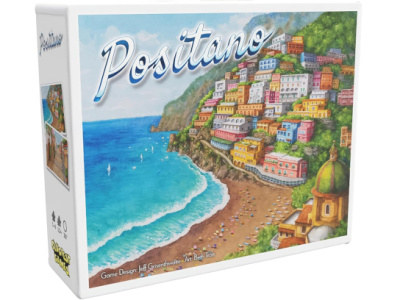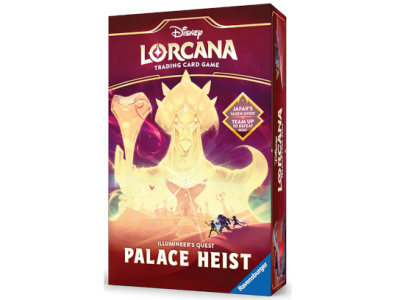Shards of Infinity Deckbuilding Game
Publisher: Ultra Pro Entertainment / Stone Blade Entertainment
Release Date: April 2, 2018
Price: $20.00
Game Designer(s): Gary Arant & Justin Gary
Format: Deckbuilding Game
Number of Players: 2 to 4
Playing Time: 30 minutes
Product #: 10133
Age Rating: 10 and up
ICv2 Rating: 3.5 Stars out of 5
For a lot of games in the deck building genre, there is a vague feeling that you’re playing solitaire. Sure, you race against the other players to score the most points, and you may compete more directly for a limited supply of upgrade cards. But it’s pretty rare that you have a direct confrontation. But that is most definitely not the case with Shards of Infinity, the latest creation from the co-designer of the Ascension: Deckbuilding Game, which draws heavily from its roots in collectible card games.
Summary: Set in a future world once controlled by a reality-warping device called the "infinity engine," Shards of Infinity is about factions competing to either learn the secret of controlling their own "shard" of that engine, or eliminating all of their rivals for power. As the leader of a faction, each player recruits allies and champions to fight for their cause, then uses them to launch attacks against their foes. Meanwhile, each faction increases its "mastery" or ability to use "Infinity Shards" so that they can become the new ruler of the world.
Mechanically, gameplay is similar to other deck builders: each player manages their personal deck of cards, adding more powerful cards from a common pool of options and removing weaker cards. Like Ascension, this common pool changes over time, with new cards replacing cards that are purchased. Each turn, they play or discard their entire hand. Each card played may provide gems to buy cards, power to attack, mastery to unlock new abilities, or health.
Originality: There are two interesting twists here. The first is the victory conditions, for there are two routes to winning the game, neither of which involve "victory points." The most straightforward method is to attack your opponents and reduce their health score to zero, eliminating them from the game. The last player standing can claim victory. The second win condition ties into the game’s other interesting twist, and that’s the mastery score. Each player tracks their mastery during the game, and many cards offer more powerful effects if the player using them has a high enough mastery score. This forces a constant trade off: should you increase mastery if it means not attacking? If a player can get enough mastery, then play their "Infinity Shard" card, they inflict "infinite" damage to the other players, winning the game instantly.
Presentation: Thankfully, Ultra Pro has rejected the recent trend to pack card games in oversized, shelf-hogging boxes, instead presenting a tightly-packed game with almost no air in the box. The box itself is bright, with a menacing creature of some kind staring out at the viewer and a large title that’s easy enough to read. The back has some nice fluff text and examples of some of the cards, which have excellent artwork. Sadly, the graphics on the cards did not get as much attention as the artwork, with some card types (mercenaries in particular) being a little hard to recognize. As a nice added touch, though, each player has their own character "card"—really a character board—fitted with tracking wheels to record their health and mastery. These would have been nicer, though, if the numbers were larger so they could be read more easily from across the table.
Quality: Ultra Pro routinely produces products of fine quality, and Shards of Infinity is no exception. The cards are pretty and have text that is clear and easy to understand. They are printed on good quality stock despite the fact that most deck builder players sleeve their cards for protection. The player boards are nice and sturdy and the tracking wheels are easy to use, and thanks to those no tokens or markers are needed, helping keep the game compact both in storage and in play. The rules are brief and well-written, with lots of excellent illustrations, though I would have liked more examples of play.
Marketability: Every time a new deck builder is announced, the question inevitably arises: does the world really need another one? But I think games like Shards of Infinity prove that the style is still developing. In this case particularly for fans of the genre who want a game with more direct confrontation between players and less of the "multi-player-solitaire" feel that some deck builder games suffer from. Plus, the proven track record of Justin Gary and the backing of Ultra PRO suggest that this game will be well supported moving forward, giving it excellent potential to grow a fan base.
Overall: I continue to enjoy watching new ideas grow out of the deck builder genre, and I think that Shards of Infinity moves it in some interesting directions. I particularly like the interplay between mastery and the other game resources, and enjoy the (sometimes painful) decisions that spawn from this feature. I also like the way that, unlike most deck building games, cards can be purchased for future use or paid for and used immediately as a one-shot event. It’s a feature that opens up more even more options and decisions.
On the downside, the game prominently features one of my least favorite game mechanics: player elimination. It’s just less fun to get knocked out of a game before the final tally and get stuck watching others keep playing. Combined with the more confrontational nature of the game, it is ill-suited for light, casual playing groups.
Of course, for players who are looking for that kind of experience (and there are many, as evidenced by the continuing popularity of collectible card games) combined with the features of a deck building game, Shards of Infinity is a very worthy offering. And that’s why I’m giving this game 3.5 out of 5.
-- William Niebling

ICv2 Stars: 3.5 (out of 5)
Posted by William Niebling on April 23, 2018 @ 1:40 pm CT
MORE GAMES
With 'Fanzone: Electronic Football Trivia Game'
July 18, 2025
Ultra PRO will release Fanzone: Electronic Football Trivia Game into retail.
Booster Set Adds King Ghidorah, Gigan, and Spacegodzilla
July 18, 2025
Bushiroad announced a second booster set for Godzilla Card Game.
MORE REVIEWS
ICv2 Stars: 4 (out of 5)
July 11, 2025
Here's a review of Positano, published by Slugfest Games.
ICv2 Stars: 3.5 (out of 5)
June 20, 2025
Check out the review of Disney Lorcana TCG: Illumineer's Quest - Palace Heist, from Ravensburger.








